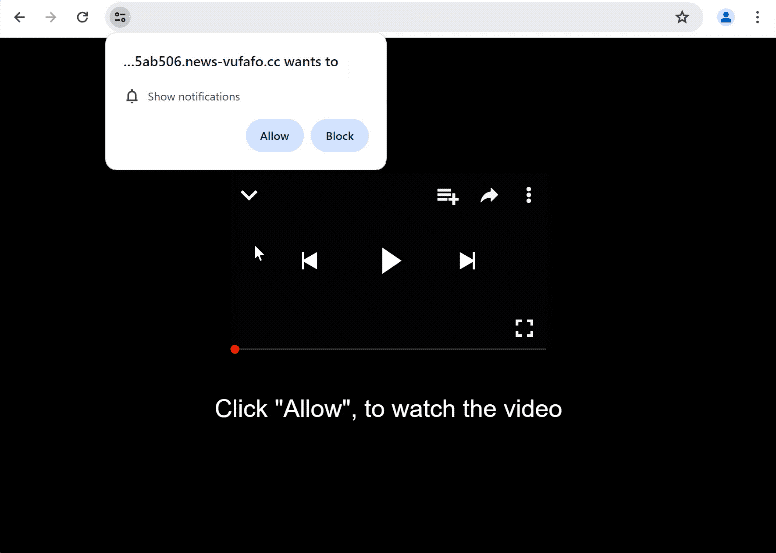How to stop news-yepiwu.cc redirects
news-yepiwu.cc is a deceptive website that tries to trick users into allowing ads to be shown on the desktop. It misuses a legitimate browser feature that allows sites to show users notifications. If you get redirected to the site, you will see a browser prompt saying “news-yepiwu.cc wants to show notifications”. Clicking “Allow” will give the site permission to spam your screen with ads.
The site is mostly empty of content. The only thing it shows is a video player. When you initially get redirected to the site, the video player will start loading and suddenly stop. That’s when the browser alert will pop up saying ‘”news-yepiwu.cc wants to show notifications”. The site will also display a message saying you need to click “Allow” to watch the video. This tactic may work on users who were trying to watch copyrighted content illegally and were redirected. Clicking “Allow” will give the site authorization to start spamming ads. These ads will appear on the right side of the screen, similarly to where legitimate notifications pop up. Clicking on those notifications could lead to potentially dangerous websites that conceal malware or promote scams. If you have given news-yepiwu.cc permission, the sooner you revoke it, the better.
The feature does have legitimate uses and can sometimes be useful. If you frequently visit a particular website and want to see more of its contents, you can allow it to show you notifications as long as the site is safe. For example, a news site would show important news alerts, and you’d only need to click on the notification to access the article. You can also easily revoke the permission to show notifications in the browser’s settings when you no longer want to see them.
What triggers random redirects to news-yepiwu.cc?
There are two likely reasons why you were redirected to news-yepiwu.cc and/or similar sites. Either your computer has adware installed or you do not have an adblocker and visit high-risk websites. Many websites generate revenue by exposing users to highly questionable ads and triggering redirects. For example, sites that have pornographic or pirated content trigger redirects when users interact with anything on them. Fortunately, both intrusive ads and random redirects are preventable with an adblocker program.
Adware installed on the computer can also trigger redirects. Adware is considered to be a minor infection, and it’s usually installed via software bundling. Infections like adware and browser hijackers can be attached to free programs as additional offers. These offers are preselected to be installed automatically, without users needing to explicitly authorize their installation. The offers are technically optional but they need to be manually deselected to stop their installations. The offers are hidden in settings users don’t normally use, so they often go unnoticed by users. This makes software bundling a somewhat frowned upon installation method. It’s common for programs that use it to be detected as potential threats by anti-virus programs.
Preventing these unwanted installations is not difficult as long as you pay attention when installing programs. When given the option, opt for Advanced (Custom) settings during installation. The installation window will recommend using Default settings but if you do that, all added offers will be authorized to be installed. Opting for Advanced settings will allow you to deselect all offers, preventing them from installing. Deselecting all offers is always recommended because legitimate programs do not use this installation method. By allowing these installations, you will only fill your computer with junk programs that can be difficult to get rid of.
How to stop news-yepiwu.cc notifications?
Adware has the capabilities to trigger random redirects so we recommend scanning your computer with anti-virus software like WiperSoft. The program will detect and remove the adware that’s causing the issues, and your browsing will go back to normal. If adware is not detected, install an adblocker to block intrusive ads and redirects when you browse dubious websites.
If you were tricked into allowing news-yepiwu.cc to show you notifications, you can easily revoke the permission in your browser’s settings. If you need assistance, use the instructions below. Review all sites that have permission and remove the ones you do not recognize.
- For Mozilla Firefox: Open Menu (the three bars top-right corner) -> Options -> Privacy & Security. Scroll down to Permissions, press Settings next to Notifications, and remove news-yepiwu.cc and any other questionable websites. You can permanently turn off these notification requests by checking the “Block new requests asking to allow notifications” box in the same Notifications settings.
- For Google Chrome: Open Menu (the three dots top-right corner) -> Settings -> Privacy and security -> Site Settings. Click on Notifications under Permissions, and remove news-yepiwu.cc and any other questionable websites. You can stop these notification requests permanently by toggling off “Sites can ask to send notifications”.
- For Microsoft Edge: Open Menu (the three dots top-right corner) -> Settings -> Cookies and site permissions -> Notifications. Review which sites have permission and remove news-yepiwu.cc and any other questionable websites. You can permanently turn off these notification requests by toggling off “Ask before sending”.
Site Disclaimer
WiperSoft.com is not sponsored, affiliated, linked to or owned by malware developers or distributors that are referred to in this article. The article does NOT endorse or promote malicious programs. The intention behind it is to present useful information that will help users to detect and eliminate malware from their computer by using WiperSoft and/or the manual removal guide.
The article should only be used for educational purposes. If you follow the instructions provided in the article, you agree to be bound by this disclaimer. We do not guarantee that the article will aid you in completely removing the malware from your PC. Malicious programs are constantly developing, which is why it is not always easy or possible to clean the computer by using only the manual removal guide.

